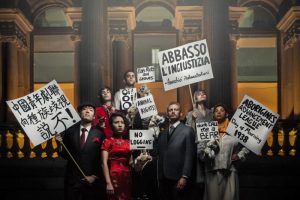04/10/2012 – 13/10/2012
Produced by
Venue
With Melbourne Model: the Musical among his creations, Fregmonto Stokes is no stranger to putting politics into opera. His new work, 1938: An Opera, takes on the White Australia policy and the inaugural Aboriginal Day of Mourning.
Part of the Melbourne Fringe Festival, 1938: An Opera plays at Union House Theatre until 13 October.
With a creative team largely consisting of University of Melbourne students, and directed by Union House Theatre’s Tom Gutteridge, the show creates an alternative history where Aboriginal activist Marge Tucker teams up with Italian Anarchists and Chinese Communists to subvert a re-enactment of Governor Phillip’s landing.
Writer Fregmonto Stokes says the idea for the story came while he was taking a subject for his Bachelor of Arts (Politics and Spanish) called ‘On Country Learning’.
“The subject was run by Professor Wayne Atkinson and singer songwriter Lou Bennett (Tiddas, Black Arm Band), both of whom are Yorta Yorta people, on their land near the Murray River.
“It describes the protests that happened in 1938 on ‘Australia Day’ or alternatively Australia’s first ‘day of mourning’, when authorities were forcing Aboriginal prisoners to perform in a re-enactment of the First Fleet landing, as part of the 150th anniversary activities. They were told that their families would be harassed and starved if they didn’t perform, and activists got involved, urging them to resist. Italian anarchists protesting Australia’s pre-war sympathising with fascist Italy, and Chinese protesting Japanese occupation of China all became involved, so it became a very multicultural – and multilingual event,” Mr Stokes says.
“There’s such a history of monolingualism in Australian culture, so I deliberately built multilingual lyrics and words into the show, which features songs in English, the Yorta Yorta language, Cantonese and Italian.”
Mr Stokes was awarded a Jump Mentorship from the Australia Council for the Arts for the project, and visited Yorta Yorta country to work further with Lou Bennett.
“Working with her was really good,” he says. “We talked a lot about community protocol, and the best way of researching this topic. We talked about the concept of reciprocity. There has been a lot of exploitative research done with Indigenous people, so the idea of reciprocity is really important. For everything they gave me, in terms of stories and information, I tried to exchange something.
“Before going up to Cummeragunja (where the original mission was established for local Aboriginal people, near Barmah, on the Murray), I went to Canberra where I was able to access the Aboriginal Archive. I found recordings of some community elders speaking Yorta Yorta, and singing songs the community hadn’t had access to before. I brought back copies of these recordings and they were put into their database. We talked a little bit about peoples’ history and connection to those stories. Lou emphasised that process, and also did the translation of the Yorta Yorta song in the show.”
Mr Stokes says the genre of 1938: An Opera, sits between opera and musical theatre.
“It’s the genre of things like Brecht’s Threepenny Opera. It’s satirical and comedic, with songs and spoken word,” he says.
Although the 25-year-old Melbourne Bachelor of Arts (Politics and Spanish) and Diploma of Creative Arts graduate has never studied music (he worked with Angus Leslie and Ashlee Clapp on the score), he says he enjoys a variety of different satirists, and finds the political and comedic combination works well together.
“Satire is able to undercut the politics, and make it less didactic,” he says.
Next up he plans to turn his attention to “a few mining magnates out there” who he thinks might need a satirical opera treatment.
Director of both the show, and Union House Theatre, Tom Gutteridge describes 1938: An Opera as a remarkable and sophisticated piece of writing.
“Freg has a very clever understanding of the way politics and comedy interact,” he says. “He has developed a highly individual style where he walks a fine line between dark farce and pointed political commentary.”
Having worked with the young writer on Melbourne Model, Mr Gutteridge says the “raw energy and inventiveness are still there in this show, but augmented by more complex character and plot development.”
Mr Gutteridge also says the show has brought together students who would normally not encounter each other, let alone work together to create something “this huge and significant”.
“It’s a wonderful example of what can be achieved in such a diverse community with so many talented students from different backgrounds.”

